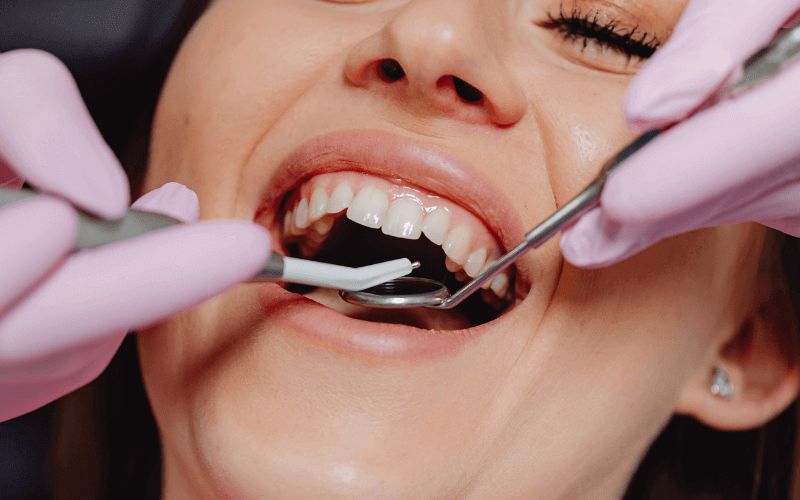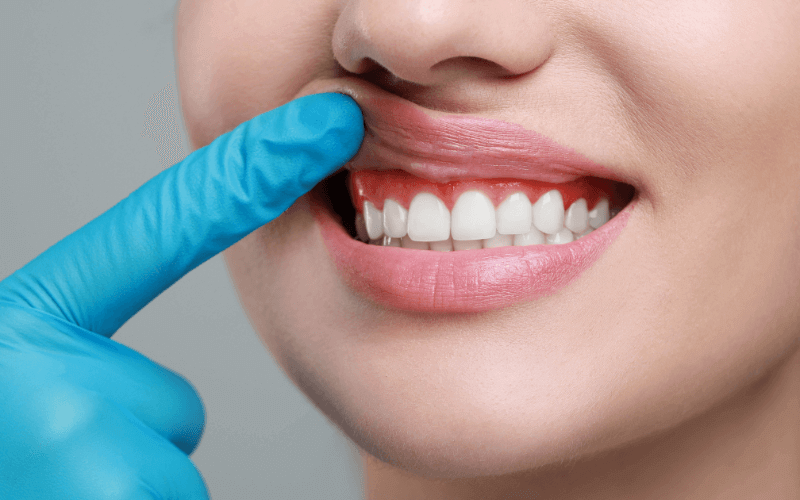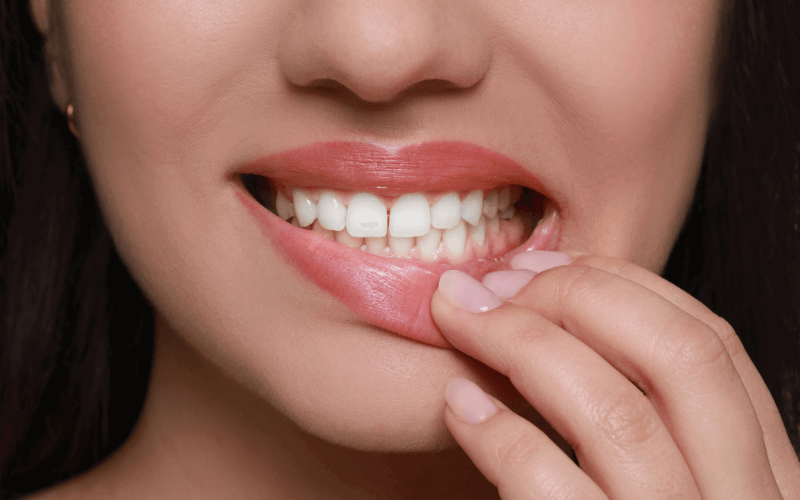Bleeding gums are a common oral health issue that can often be a source of concern for many people. While it might seem minor, the presence of blood after brushing or flossing can indicate underlying dental problems or other health conditions. Gums may bleed due to a variety of reasons, ranging from poor oral hygiene and improper brushing techniques to more serious conditions like gum disease or systemic health issues. Understanding the potential causes of bleeding gums is crucial for addressing the problem effectively and preventing more severe complications. This article explores ten possible causes of bleeding gums, offering insights into their symptoms and recommended treatments. By recognising these causes and taking appropriate action, you can maintain healthy gums and overall oral health.
1. Gingivitis
Gingivitis is the most common cause of bleeding gums and is often the first stage of gum disease. It occurs when plaque, a sticky film of bacteria, accumulates on the teeth and gums. This plaque, if not removed through regular brushing and flossing, hardens into tartar, which further irritates the gums. The bacteria in plaque produce toxins that cause inflammation and swelling, leading to the characteristic symptoms of gingivitis: redness, swelling, and bleeding during brushing or flossing.
Symptoms and Risk Factors
- Red, Swollen Gums: Early signs include gums that appear redder than usual and are swollen.
- Bleeding: Gums may bleed easily during brushing or flossing, even with gentle pressure.
- Bad Breath: Persistent bad breath can also be a symptom, caused by the bacteria in plaque.
Prevention and Treatment
- Oral Hygiene: The most effective way to prevent and treat gingivitis is through diligent oral hygiene, including brushing twice a day with fluoride toothpaste and flossing daily. Using an antiseptic mouthwash can also help reduce bacteria.
- Professional Cleaning: Regular dental check-ups and professional cleanings are crucial. A dental professional can remove tartar that brushing and flossing alone cannot, preventing the progression of gingivitis into more serious gum disease.
2. Periodontitis
If gingivitis is left untreated, it can progress to periodontitis, a more severe form of gum disease. In periodontitis, the inflammation spreads below the gum line, damaging the tissues and bone that support the teeth. This can lead to the formation of pockets between the teeth and gums, where bacteria can accumulate and cause further damage.
Symptoms and Risks
- Receding Gums: Gums may start to pull away from the teeth, making them appear longer.
- Loose Teeth: As the supporting bone and tissue deteriorate, teeth can become loose.
- Pus Between Teeth and Gums: In advanced cases, pus may be present, indicating an infection.
Management and Treatment
- Scaling and Root Planing: This deep-cleaning procedure removes plaque and tartar from below the gum line and smooths the tooth roots, helping gums reattach to the teeth.
- Surgery: In severe cases, surgical interventions like flap surgery or bone grafts may be necessary to restore supportive tissues.
- Antibiotics: Antibiotics may be prescribed to combat bacterial infection.
3. Improper Brushing and Flossing Techniques
Brushing and flossing are essential for maintaining oral health, but doing them incorrectly can harm your gums. Using a toothbrush with hard bristles or brushing too vigorously can damage the delicate gum tissue, leading to irritation and bleeding. Similarly, improper flossing techniques, such as snapping the floss between the teeth or using excessive force, can injure the gums.
Symptoms
- Immediate Bleeding: Gums may bleed immediately after brushing or flossing, especially if done with excessive force.
- Sensitivity: The gums may become sensitive and sore.
Recommendations
- Use a Soft-Bristled Toothbrush: Switch to a soft-bristled toothbrush and use gentle, circular motions to clean your teeth.
- Proper Flossing Technique: Use a gentle sawing motion to slide the floss between the teeth, being careful not to snap it onto the gums. Gently curve the floss around each tooth and slide it under the gum line to remove plaque.
4. Medications and Health Conditions
Certain medications and health conditions can contribute to gum bleeding. Blood-thinning medications, such as aspirin, warfarin, and certain anticoagulants, reduce the blood’s ability to clot, making bleeding more likely. Additionally, conditions like diabetes can increase the risk of gum disease and bleeding due to impaired immune response and poor wound healing.
Other Contributing Conditions
- Hormonal Changes: Hormonal fluctuations during pregnancy, menstruation, or menopause can make gums more sensitive and prone to bleeding.
- Systemic Diseases: Conditions like leukemia, which affects blood clotting, can lead to spontaneous gum bleeding.
Management
- Consult with Healthcare Providers: Inform your dentist of any medications you are taking and discuss any health conditions that may impact your oral health. Your dentist can adjust your oral care routine accordingly and coordinate care with your physician if needed.
5. Nutritional Deficiencies
A diet lacking in essential nutrients can weaken your gums and increase the likelihood of bleeding. Vitamins C and K are particularly important for gum health. Vitamin C is crucial for the repair and maintenance of tissues, including the gums, while Vitamin K plays a vital role in blood clotting.
Symptoms
- Swollen Gums: Deficiency in Vitamin C can lead to swollen, bleeding gums, a condition known as scurvy.
- Prolonged Bleeding: A deficiency in Vitamin K can result in prolonged bleeding from minor gum injuries.
Prevention and Treatment
- Balanced Diet: Ensure your diet includes a variety of fruits, vegetables, and other nutrient-rich foods. Citrus fruits, strawberries, and leafy greens are excellent sources of Vitamin C, while Vitamin K can be found in green vegetables, fish, and meat.
- Supplements: In cases where dietary intake is insufficient, supplements may be recommended by a healthcare provider.
6. Stress and Lifestyle Factors
Stress can have a significant impact on oral health, including contributing to bleeding gums. High-stress levels can weaken the immune system, making it harder for the body to fight off infections, including gum infections. Additionally, stress can lead to poor oral hygiene practices, such as neglecting regular brushing and flossing, which increases the risk of gum disease.
Symptoms and Risks
- Increased Inflammation: Stress can exacerbate inflammation in the body, including in the gums, leading to swelling and bleeding.
- Poor Oral Care: People under stress might skip regular dental hygiene routines, leading to plaque buildup and gingivitis.
Management
- Stress Reduction Techniques: Practices such as meditation, exercise, and proper sleep can help manage stress levels.
- Consistent Oral Hygiene: Maintaining a consistent oral care routine is essential, even during stressful times.
7. Smoking and Tobacco Use
Smoking and the use of other tobacco products are major risk factors for gum disease and bleeding gums. Tobacco can impair the immune response, making it harder for the gums to heal from infections and leading to an increased buildup of plaque and tartar on the teeth.
Symptoms and Risks
- Delayed Healing: Smokers often experience slower healing of gum tissues, which can exacerbate bleeding.
- Increased Plaque and Tartar: Tobacco use leads to an increase in plaque and tartar accumulation, contributing to gingivitis and periodontitis.
Prevention and Treatment
- Quitting Tobacco: Reducing or eliminating the use of tobacco products can significantly improve gum health and reduce bleeding.
- Regular Dental Visits: Frequent cleanings and check-ups can help manage the harmful effects of smoking on the gums.
8. Hormonal Changes in Women
Hormonal fluctuations can affect the gums, making them more sensitive and prone to bleeding. This is particularly true during puberty, menstruation, pregnancy, and menopause. The increase in hormones can cause gums to react more sensitively to plaque and other irritants.
Symptoms and Risks
- Swollen Gums: Gums may become swollen, red, and tender.
- Increased Bleeding: Gums may bleed more easily during brushing and flossing.
Management
- Enhanced Oral Care: Women experiencing hormonal changes should maintain a diligent oral hygiene routine and visit their dentist regularly.
- Professional Advice: Consulting with a dentist can help manage symptoms related to hormonal changes.
9. Infections and Illnesses
Certain infections and illnesses, such as viral or fungal infections, can lead to gum bleeding. Conditions like oral thrush (a fungal infection) or herpes simplex (a viral infection) can cause sores and inflammation in the mouth, leading to bleeding gums.
Symptoms and Risks
- Oral Lesions: Presence of sores or white patches in the mouth.
- Pain and Discomfort: May accompany bleeding, especially if the infection is severe.
Management
- Medical Treatment: Depending on the cause, antifungal, antiviral, or antibacterial treatments may be necessary.
- Oral Hygiene: Maintaining oral hygiene can help prevent secondary infections and reduce symptoms.
10. Immune System Disorders
Autoimmune diseases and other immune system disorders can affect oral health, leading to bleeding gums. Conditions like lupus or Crohn’s disease can cause the immune system to attack healthy tissues, including the gums, leading to inflammation and bleeding.
Symptoms and Risks
- Chronic Inflammation: Persistent inflammation can damage the gums and underlying structures.
- Gum Sensitivity: Increased sensitivity and bleeding can occur.
Management
- Coordinated Care: Treatment often involves managing the underlying condition with the help of a healthcare provider and maintaining regular dental visits.
- Medication: Medications to control the immune response may be prescribed.
Bleeding gums are a sign that something is amiss with your oral health. While occasional bleeding can occur, persistent or severe symptoms should not be ignored. Whether the cause is as simple as adjusting your brushing technique or as serious as a systemic health issue, addressing the underlying cause promptly can prevent further complications. Regular dental check-ups, proper oral hygiene, and a balanced diet are key to maintaining healthy gums. If you experience persistent gum bleeding, consult your dentist for a thorough evaluation and personalised care plan.
When to See a Dentist

Bleeding gums can often be an early warning sign of more serious dental or health issues, and knowing when to seek professional help is crucial for preventing complications. If you experience any of the following symptoms alongside bleeding gums, it’s important to schedule an appointment with your dentist:
- Persistent Bleeding: If your gums bleed regularly or don’t stop bleeding after brushing or flossing, this could indicate an underlying issue such as gum disease that requires professional evaluation and treatment.
- Pain and Swelling: Accompanying pain, swelling, or tenderness in the gums can be signs of infection or advanced gum disease. If these symptoms persist, they may indicate a need for more intensive treatment.
- Receding Gums: Noticeable recession of the gums, where they pull away from the teeth, can expose the tooth roots and lead to sensitivity. This symptom often suggests periodontitis and requires immediate dental care.
- Loose or Shifting Teeth: If your teeth feel loose or you notice changes in the way your teeth fit together when you bite, it could be a sign of significant bone loss due to advanced gum disease.
- Persistent Bad Breath: Chronic bad breath, even with good oral hygiene, can be a sign of gum disease or other oral health issues that need to be addressed.
- Pus or Signs of Infection: The presence of pus between the teeth and gums or along the gum line is a serious sign of infection and should prompt an immediate visit to the dentist.
- Gum Discolouration: If your gums appear unusually red, purple, or otherwise discoloured, it could indicate inflammation or infection that needs professional assessment.
- Health Conditions and Medications: Individuals with systemic conditions like diabetes, or those on blood-thinning medications, should be vigilant about gum health and consult a dentist if they experience bleeding gums. These conditions can complicate oral health and require coordinated care with your healthcare provider.
Seeing a dentist regularly, even without symptoms, is important for maintaining overall oral health. Regular check-ups can catch issues early before they become more serious and harder to treat. If you notice any of these symptoms or have concerns about your gum health, don’t hesitate to contact your dentist for a thorough examination and appropriate treatment. Early intervention is key to preserving your oral health and preventing more severe complications.
Suggested Reading: Have a Dental Emergency on the Weekend? Here’s What You Should Do
Why Choose Dental Aspects for Your Gum Health

Dental Aspects is dedicated to providing exceptional dental care, particularly in diagnosing and treating gum-related issues. Our experienced team of dental professionals is equipped with the latest technology and a wealth of knowledge in gum health. We offer comprehensive care that ranges from preventive measures to advanced treatments for conditions like gingivitis and periodontitis. At Dental Aspects, we emphasise a personalised approach, ensuring that each patient receives a tailored treatment plan that addresses their specific needs and concerns.
What sets us apart is our commitment to patient education and preventive care. We believe that a well-informed patient is a healthier patient, and we take the time to educate you on proper oral hygiene practices and the importance of regular dental visits. Our state-of-the-art facilities and gentle, compassionate care ensure a comfortable experience, making it easier for you to maintain optimal gum health. Whether you need routine cleanings, deep scaling, or other procedures like Root Canal Treatment, Emergency Dentistry, Crowns, or Dentures, Dental Aspects is your trusted partner in achieving and maintaining a healthy smile. Choose our Browns Plains Dental Clinic for a reliable, patient-centered approach to dental care, where your comfort and health are our top priorities.Suggested Reading: How to Find A Good Dentist for Your Family: 9 Things To Look For


